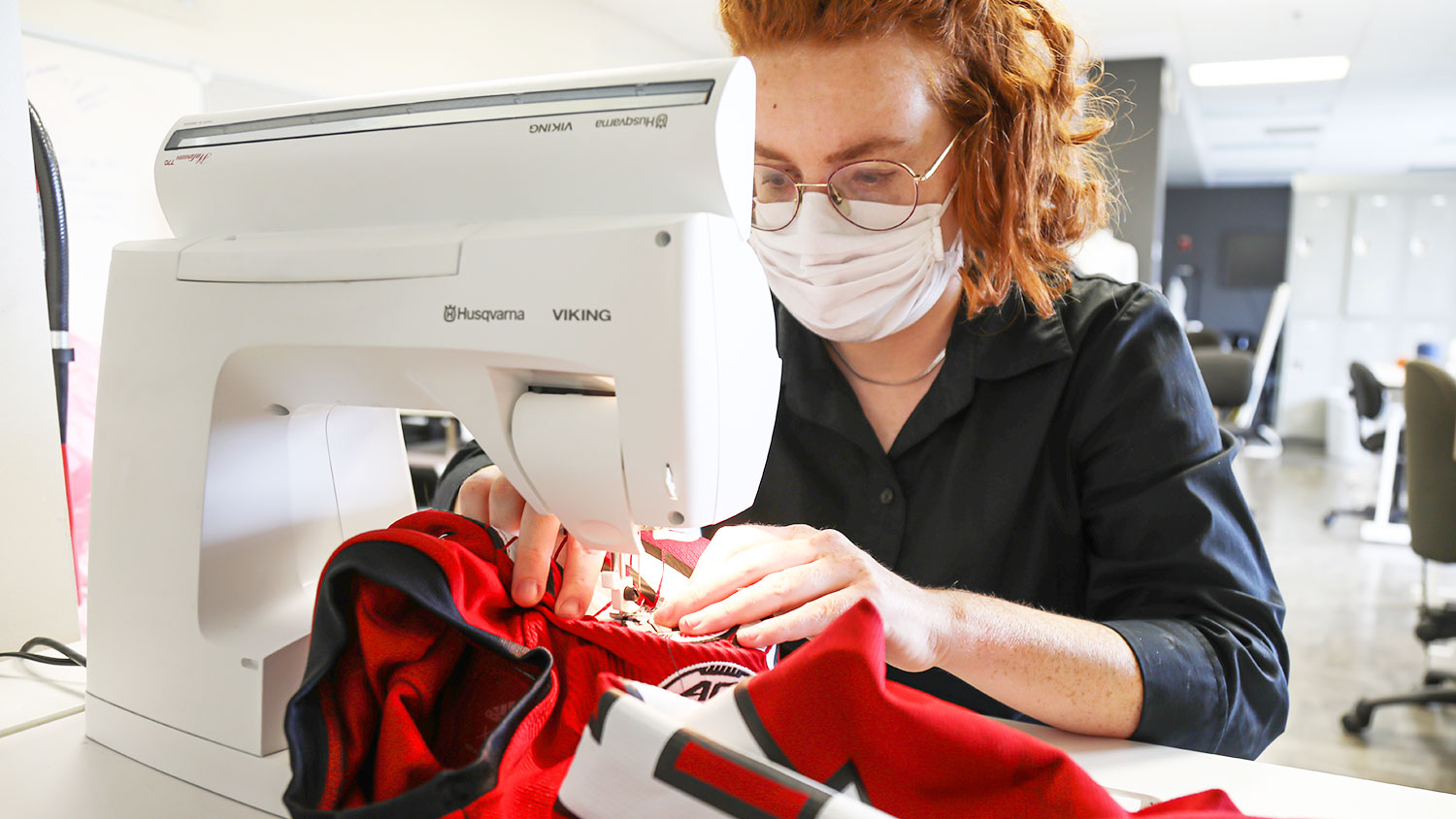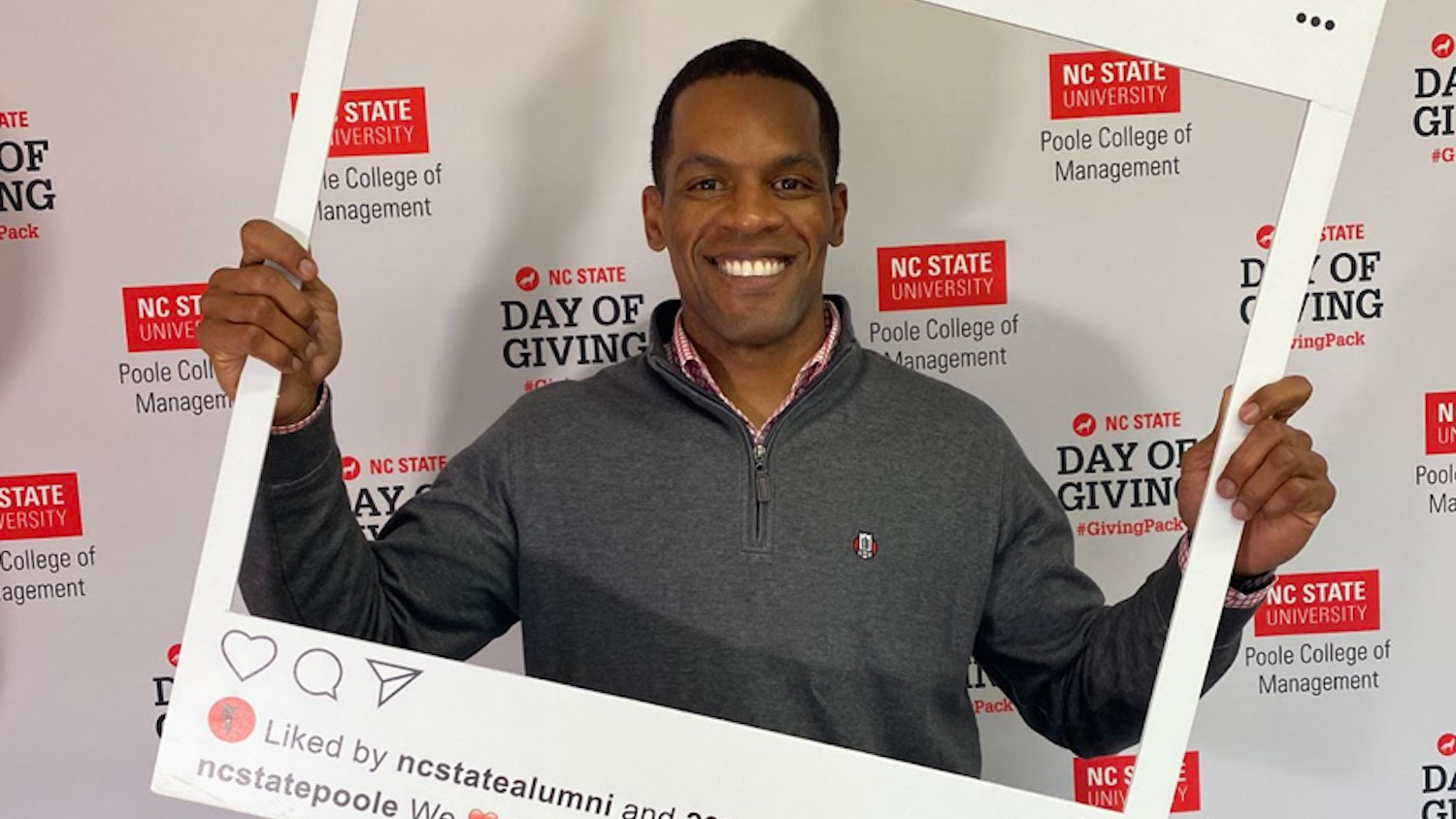Textiles Loaner Program Keeps Students on Track

As the sole college in the nation dedicated to textile research and education, NC State’s Wilson College of Textiles has made hands-on, experiential learning an integral part of its programs.
For the Department of Textile and Apparel, Technology and Management (TATM), this focus has meant creative and collaborative pivots — aided by philanthropy — to ensure its students stay engaged and on track in their studio courses even during the remote learning necessitated by the COVID-19 pandemic.
Courses like Fashion and Textile Management (FTM) 415 and 497, which serve as the culmination of a student’s time in the program, are critical to building skills and developing portfolios for job-seeking. Dakota Batch, a graduate student pursuing a doctorate focused on textile technology management, is currently teaching FTM 415. Last spring, as coronavirus began to impact campus, she was assisting with a section in preparation for teaching the course that fall.
Everything changed.
“This class is extremely important for students to put together all their knowledge, from designing a collection to actually constructing the garments— it’s a capstone to their four years here. Students put these images in their portfolios when they’re searching for jobs, and it makes them really competitive because it shows they not only have the knowledge, but they have the hands-on skills,” she explained.
“Donor support has really helped us give students the experience they need for their careers. It’s very important. You could tell how much the students appreciated it.” – Abdel-Fattah M. Seyam
Shifting to remote instruction meant students who didn’t have a sewing machine at home or the funds to purchase one found themselves devising solutions such as gluing or stapling their garments together.
“It was heartbreaking to see, though it showcased their creativity and ingenuity,” Batch said. “But I know they would have preferred to use a sewing machine or have a mannequin.”
Abdel-Fattah M. Seyam, Charles A. Cannon Professor of Textiles and head of the Department of Textile and Apparel, Technology and Management, knew right away that the department would need to take action.
“Our students really engage in hands-on learning,” Seyam said. “We have equipment here to prepare students for the industry. So, we were concerned about how our students could continue learning, or if they would be learning on machines that wouldn’t be suitable or helpful. We decided to take matters into our own hands to help our students.”
“The dress form was crucial in allowing me to properly draft, drape and fit my garments for senior studio. Without the form, I would not have been able to drape or properly check the fit of any of my garments, and I don’t know how I would have completed my coursework.” – student survey response
The North Carolina Textile Foundation stepped forward to help and its assistance, combined with support from the Dean’s Textiles Innovation Fund — which is strengthened through annual, unrestricted gifts from donors — and department funds, gave TATM faculty and staff the ability to quickly procure mannequins in a variety of sizes and sewing machines to create a loaner program.
As was common in many industries last spring, sewing machine and mannequin manufacturers faced supply chain disruptions. Still, by the time the fall semester shifted to remote learning, the department was prepared.
Seyam saw incredible collaboration from faculty and staff to make the loaner program a reality and noted that lab and studio technician Bailey Knight was instrumental in getting the loaners ordered. “They all made my job easy,” he said with a smile. “I just had to approve.”
And when Batch’s fall FTM 415 course pivoted online, the transition was smooth.
“It helped my success with my senior studio because I only have an adjustable dress form, which is hard to pin and drape fabric on.” – student survey response
“The fact that we were able in four months to have this entire program set up — it’s really fantastic, and I applaud all the planning that went into it, from lab managers to TAs to the staff purchasing the goods,” she said.
Batch has seen firsthand how beneficial the loaner program has been in keeping students on track for graduation and success with the highest quality equipment available outside of the apparel studio. This is especially true of students working on garments constructed from heavy fabrics such denim or canvas. For example, Batch explained that the waistband of a pair of jeans usually has five layers of material, which a typical home sewing machine doesn’t have the engine power to sew through.
The loaner program has been critical in making the studio model successful beyond the physical classroom — as has faculty commitment to developing creative methods of instruction.
“What complemented the loaner program is our faculty shooting more videos and going into the lab to demonstrate how to use equipment,” Seyam said. From a CAD-driven cutter to a 60-inch knitting machine, faculty learned how to show students the mechanics virtually in place of in-person instruction.
“I was so thankful to be able to utilize the materials that the college had to offer. The Singer sewing machine allowed me to complete my final project… My piece was a to-scale geometric, sustainable, denim dress. Thanks to the TATM department and the Dean’s Textiles Innovation Fund, I was able to save hundreds of dollars and then put the money I saved toward other educational expenses.” – student survey response
Batch said that recording videos and facilitating remote learning has helped her grow as an instructor by encouraging her to think about different ways to teach design and construction of garments.
“As long as I can work through the issue, I know there’s always going to be a solution,” she said. “And it made me feel more comfortable coming back in person for this semester because I already knew that I would be able to problem-solve. Now, I know I’m going to have an answer. I’m going to find a way somehow, one way or another.”
Finding a way to solve a problem is the type of think and do spirit that Wilson College instills in its students, and Seyam is grateful to donors for helping the entire department work toward a solution.
“Donor support has really helped us give students the experience they need for their careers. It’s very important. You could tell how much the students appreciated it,” Seyam said. He shared that the program will continue even as in-person learning resumes.
“It was super helpful to be able to use a high-quality machine! I am so appreciative because I did not have my own personal sewing machine. I loved the machine I was loaned so much that I saved up to buy the same one for myself. Thank you!” – student survey response
Over the past year, unrestricted gifts to enhancement funds have proved beneficial across the university, and Batch doesn’t see that changing any time soon.
“If COVID-19 has taught us anything, it’s to start expecting the unexpected,” she said. “You never know how a student’s needs will change. Private support has helped improve our students’ time in class.”
We’re meeting tomorrow’s challenges.
- Categories:


